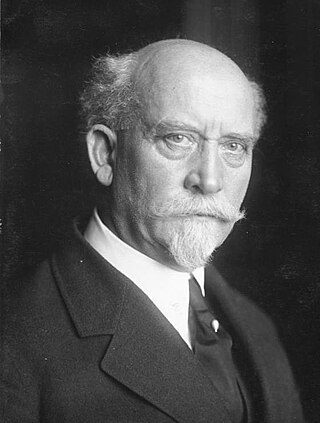
Philipp Heinrich Scheidemann was a German politician of the Social Democratic Party of Germany (SPD). In the first quarter of the 20th century he played a leading role in both his party and in the young Weimar Republic. During the German Revolution of 1918–1919 that broke out after Germany's defeat in World War I, Scheidemann proclaimed a German Republic from a balcony of the Reichstag building. In 1919 he was elected Reich Minister President by the National Assembly meeting in Weimar to write a constitution for the republic. He resigned the office the same year due to a lack of unanimity in the cabinet on whether or not to accept the terms of the Treaty of Versailles.
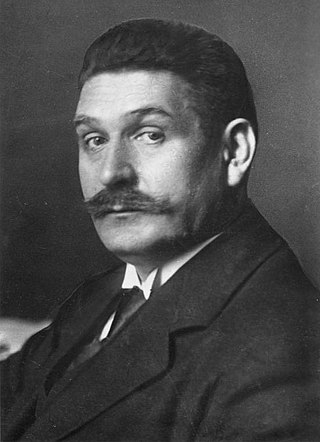
Gustav Adolf Bauer was a German Social Democratic Party leader and the chancellor of Germany from June 1919 to March 1920. He served as head of government for nine months. Prior to becoming head of government, Bauer had been Minister of Labour in the first democratically elected German cabinet. After his cabinet was brought down by the Kapp Putsch in March 1920, Bauer served as vice-chancellor, Minister of the Treasury, and Minister of Transportation in other cabinets of the Weimar Republic from May 1920 to November 1922. In 1924 and 1925 he was involved in the Barmat scandal.
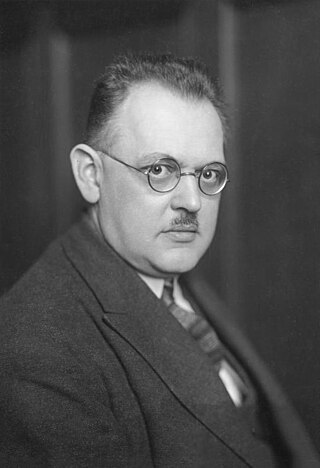
Hermann Müller was a German Social Democratic politician who served as foreign minister (1919–1920) and was twice chancellor of Germany during the Weimar Republic. In his capacity as foreign minister, he was one of the German signatories of the Treaty of Versailles.

The Centre Party, officially the German Centre Party and also known in English as the Catholic Centre Party, is a Christian democratic political party in Germany. Influential in the German Empire and Weimar Republic, it is the oldest German political party in existence. Formed in 1870, it successfully battled the Kulturkampf waged by Chancellor Otto von Bismarck against the Catholic Church. It soon won a quarter of the seats in the Reichstag, and its middle position on most issues allowed it to play a decisive role in the formation of majorities. The party name Zentrum (Centre) originally came from the fact that Catholic representatives would take up the middle section of seats in parliament between the social democrats and the conservatives.

Karl Joseph Wirth was a German politician of the Catholic Centre Party who served for one year and six months as the chancellor of Germany from 1921 to 1922, as the finance minister from 1920 to 1921, as acting foreign minister of Germany from 1921 to 1922 and again in 1922, as the minister for the Occupied Territories from 1929 to 1930 and as the minister of the Interior from 1930 to 1931. During the postwar era, he participated in the Soviet and East German Communist-controlled neutralist Alliance of Germans party from 1952 until his death in 1956.
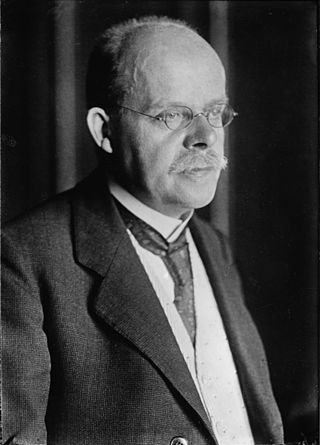
Wilhelm Marx was a German judge, politician and member of the Catholic Centre Party. During the Weimar Republic he was the chancellor of Germany twice, from 1923–1925 and 1926–1928, and served briefly as the minister president of Prussia in 1925. With a total of 3 years and 73 days, he was the longest-serving chancellor during the Weimar Republic.
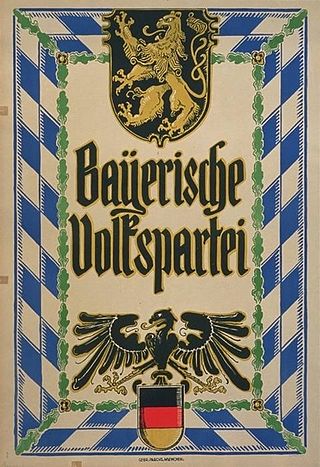
The Bavarian People's Party was a Catholic political party in Bavaria during the Weimar Republic. After the collapse of the German Empire in 1918, it split away from the national-level Catholic Centre Party and formed the BVP in order to pursue a more conservative and particularist Bavarian course. It consistently had more seats in the Bavarian state parliament than any other party and provided all Bavarian minister presidents from 1920 on. In the national Reichstag it remained a minor player with only about three percent of total votes in all elections. The BVP disbanded shortly after the Nazi seizure of power in early 1933.

Gustav Noske was a German politician of the Social Democratic Party (SPD). He served as the first Minister of Defence (Reichswehrminister) of the Weimar Republic between 1919 and 1920. Noske was known to use army and paramilitary forces to suppress the socialist/communist uprisings of 1919.

Matthias Erzberger was a politician of the Catholic Centre Party, member of the Reichstag and minister of finance of Germany from 1919 to 1920.

The Republic of Baden was a German state that existed during the time of the Weimar Republic, formed after the abolition of the Grand Duchy of Baden in 1918. It is now part of the modern German state of Baden-Württemberg.
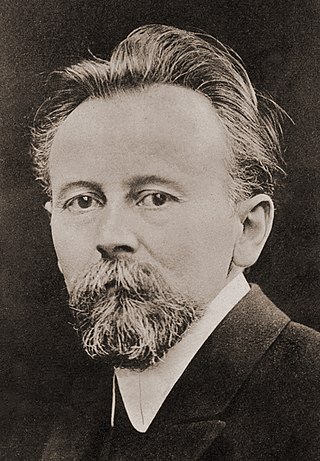
Eduard Heinrich Rudolph David was a German politician. He was an important figure in the history of the Social Democratic Party of Germany (SPD) and of the German political labour movement. After the German Revolution of 1918–19 he was a Minister without portfolio in the government of Philipp Scheidemann, before becoming Minister of the Interior in June 1919 in the succeeding government headed by Gustav Bauer. David remained in that position until October of that year.

The Weimar National Assembly, officially the German National Constitutional Assembly, was the popularly elected constitutional convention and de facto parliament of Germany from 6 February 1919 to 21 May 1920. As part of its duties as the interim government, it debated and reluctantly approved the Treaty of Versailles that codified the peace terms between Germany and the victorious Allies of World War I. The Assembly drew up and approved the Weimar Constitution that was in force from 1919 to 1933. With its work completed, the National Assembly was dissolved on 21 May 1920. Following the election of 6 June 1920, the new Reichstag met for the first time on 24 June 1920, taking the place of the Assembly.

Franz Heinrich Köhler was a German politician who served as Minister of Finance of the Weimar Republic in 1927/8. He also was the head of state (Staatspräsident) of the Republic of Baden in 1923/4 and 1926/7.
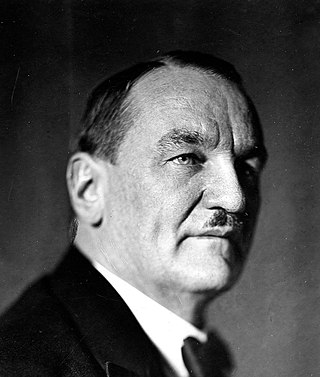
Willy Hugo Hellpach was the sixth State President of Baden. He was a member of the German Democratic Party (DDP). He was also a physician and psychologist.

Walter Friedrich Julius Köhler was a German Nazi Party politician who served as the Minister President of Baden in Nazi Germany from 1933 to 1945.
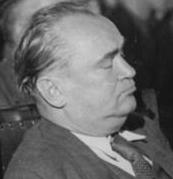
Kurt Bürger was a German politician.

The Scheidemann cabinet, headed by Minister President Philipp Scheidemann of the Social Democratic Party (SPD), was Germany's first democratically elected national government. It took office on 13 February 1919, three months after the collapse of the German Empire following Germany's defeat in World War I. Although the Weimar Constitution was not in force yet, it is generally counted as the first government of the Weimar Republic.

The Bauer cabinet, headed by Gustav Bauer of the Social Democratic Party of Germany (SPD), was the second democratically elected government during the Weimar Republic. Bauer's title was minister president until the Weimar Constitution came into force on 14 August 1919, after which he became chancellor of Germany. The cabinet took office on 21 June 1919 when it replaced the Scheidemann cabinet, which had resigned the day before in protest against the terms of the Treaty of Versailles. Although the Weimar Constitution was not in force at the time, the Bauer cabinet is generally counted as the second government of the Weimar Republic.
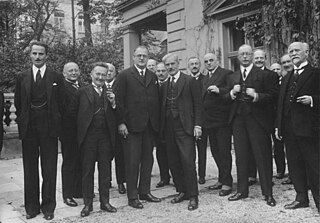
The first Müller cabinet, headed by Chancellor Hermann Müller of the Social Democratic Party of Germany (SPD), was the third democratically elected government of Germany and the second in office after the Weimar Constitution came into force in August 1919. The cabinet was based on the same three centre-left parties as the preceding Bauer cabinet: the SPD, Centre Party and German Democratic Party (DDP), a grouping known as the Weimar Coalition. It was formed on 27 March 1920 after the government of Gustav Bauer (SPD) resigned as a result of the unsuccessful Kapp Putsch, which it was seen as having handled badly.

Thomas Strobl is a German politician of the Christian Democratic Union (CDU) who has been serving as Deputy Minister-President of Baden-Württemberg since 2016.



















